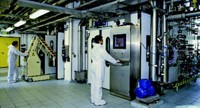Advertisement
Grab your lab coat. Let's get started
Welcome!
Welcome!
Create an account below to get 6 C&EN articles per month, receive newsletters and more - all free.
It seems this is your first time logging in online. Please enter the following information to continue.
As an ACS member you automatically get access to this site. All we need is few more details to create your reading experience.
Not you? Sign in with a different account.
Not you? Sign in with a different account.
ERROR 1
ERROR 1
ERROR 2
ERROR 2
ERROR 2
ERROR 2
ERROR 2
Password and Confirm password must match.
If you have an ACS member number, please enter it here so we can link this account to your membership. (optional)
ERROR 2
ACS values your privacy. By submitting your information, you are gaining access to C&EN and subscribing to our weekly newsletter. We use the information you provide to make your reading experience better, and we will never sell your data to third party members.
Business
Indian Firms Go Global
Acquisition of beleaguered fine chemicals assets represents an inroad to the Western market
by Rick Mullin
September 25, 2006
| A version of this story appeared in
Volume 84, Issue 39
The full-fledged entry of Indian producers into the pharmaceutical chemicals business is converging with the exit of Western chemical companies from the sector after steadily losing money in it since the late 1990s. The result is that low-cost Indian producers are grabbing up beleaguered, high-cost assets in the Western firms' wake.
It began late in 2005 with Avecia's sale of facilities in the U.K. and Canada to Nicholas Piramal India Ltd. (NPIL). Earlier this year, Solutia sold its Swiss operations, CarboGen Amcis, to Dishman Pharmaceuticals & Chemicals, and Rhodia sold its U.K.-based Pharma Solutions business to Shasun Chemicals & Drugs.
Although other Western contract manufacturers were unlikely to buy these businesses, many in the industry are asking why well-established Indian firms would want to graft the world's most expensive operating sites onto their low-cost businesses. To some, it points out the extent to which Indian firms realize that major drug companies are still skittish about doing business in India. Others see a replay of the rush into the fine chemicals sector that got Avecia, Solutia, Rhodia, and others in trouble in the first place.
India's cost advantage—even over China—is significant, largely due to the low cost of labor. A new report by Arthur D. Little Benelux puts annual labor costs at $3,000 per person in India and $4,000-$6,000 in China, versus well over $50,000 in Western Europe. The report also outlines major benefits in investment costs in India and China. Outlays per installed cubic meter of reactor capacity are at least 40% lower there than in the West and can be as much as 90% lower, says Enrico Polastro, coauthor of the report.
India is viewed as the real threat by Western firms because of its well-established pharmaceutical and fine chemicals industries. Its workforce is skilled, and companies large and small have been updating their operations to meet U.S. current Good Manufacturing Practices (cGMP) standards. India also has strength in research as well as a nascent contract chemistry research sector. China's participation, in contrast, has been advancing mainly through investments in manufacturing on the part of European and Indian firms.
Analysts agree that buying European facilities affords Indian firms several advantages, but they question the logic of operating these plants. "Some of these companies for sale are preferred suppliers of American or European pharmaceutical companies," says Peter Pollack, a fine chemicals industry consultant and former head of Lonza's custom manufacturing business. "But these purchases also mean they become owners of assets that are of very little value because they cannot produce cost-effectively any more."
Polastro adds that running the Western assets will be difficult for Indian companies whose selling proposition is an ability to deliver the Indian cost advantage to customers in the U.S. or Europe. "Will the new assets amount to just a façade, or will these companies make them an integral part of their networks?" Polastro asks. "The jury is still out on that."
Top management at the three Indian firms that purchased Western facilities say they are pursuing a best-of-both-worlds strategy. These companies have been manufacturing drug intermediates for at least 20 years, and they have moved more recently into manufacturing active pharmaceutical ingredients (APIs) on a contract basis. Access to an established customer base was an incentive in each of the deals, as was access to new technology.
All three companies are attempting to amass a range of services that will stretch from early drug development to commercial manufacture. Managers at all three admit they are taking on troubled, expensive operations, but they claim to see fits with their bases in India and a clear path to integrating the two sides. What's more, they claim that as pharmaceuticals-based companies, they can operate these facilities more efficiently than the chemical companies that owned them previously.
Michael Fernandes, executive director of custom manufacturing at NPIL, is not surprised that the Avecia acquisition raised eyebrows. But he says the deal is part of NPIL's long-range plan to develop a global contract manufacturing business.

India offers a significant cost advantage, Fernandes says, and major drug companies are beginning to take Indian producers seriously. "But as we looked across the value chain, our sense was that there were a number of areas where having a footprint abroad was actually going to enable us to speed up the capture of that opportunity."
Fernandes says Western customers, particularly emerging drug companies, want certain aspects of contract manufacturing done in close geographic proximity. The company also saw a need to reach into Europe and the U.S. to fill some technology gaps.
As part of the Avecia deal, NPIL obtained the former Torcan business in Canada, which specializes in early-stage product development and boasts a significant biotech and emerging pharmaceutical clientele. NPIL will also gain fermentation technology at Avecia's former Billingham, England, facility and high-potency and containment capabilities in Grangemouth, Scotland.
"Avecia is very well-known for its proprietary technologies for catalysts," Fernandes says. "These technologies are beginning to apply to products we are manufacturing in India."
NPIL also purchased Pfizer's Morpeth, England, manufacturing unit in a deal that makes the Indian company a key supplier to the drug giant. Having recently landed a seven-year contract to provide process development and scale-up services for Pfizer's animal health division, NPIL claims it will become the biggest supplier in dollar terms to Pfizer's global contract manufacturing network.
Dishman has a well-established contract research business in India, according to Janmejay R. Vyas, managing director. "We have a huge R&D center, and we do hundreds of projects, but we never get API contracts because of concerns over intellectual property protection," he says. The CarboGen Amcis acquisition, Vyas says, will help Dishman broaden its technology base and give the company a European interface with the drug industry.
In fact, the company has launched a global expansion. "We are looking at building a larger manufacturing base in India and China as well," Vyas says. "But at the same time, we are looking to create a knowledge base in Europe and the U.S. We were looking only for acquisitions that had a synergy with this model."
The $74.5 million CarboGen Amcis acquisition met these requirements, Vyas says. "When I did my own analysis of synergies between CarboGen Amcis and us, I found there could not be a better match." He explains that CarboGen typically takes APIs through Phase IIa trials, at which point Amcis picks up, making larger volumes through to commercial scale. At some point, large projects would be handed back to the customer. Now, Dishman's Indian manufacturing operations can kick in to provide building block chemicals and commercial production. The net effect is a lower cost contract for the life of the project, according to Vyas.
Mark Griffiths, chief executive officer of CarboGen Amcis, says Dishman is highly experienced in transferring technology from the U.S. and European pharmaceutical companies. Dishman is also well-connected to Asian raw material sources.
"And going forward, our focus will not be on whether we need to increase capacity in Switzerland," Griffiths says. "It will be on whether there are capacity requirements for which we will need India and China to scale up." He emphasizes that CarboGen Amcis projects in high-potency API capacity and laboratory information management are progressing.
A long-term planning effort also preceded Shasun's acquisition of Rhodia Pharma Solutions (RPS), according to Shasun CEO N. Govindarajan. The company has been working in the pharmaceutical sector for 30 years, he says, starting with intermediates and moving into APIs and finished dosage contracting. "We realized we needed to achieve a critical mass in order to move to the next level," Govindarajan says.
He says RPS presented an ideal opportunity. Geography, culture, and language were all fits, he says, as were the firm's three key technologies: hydrolytic kinetic resolution, aromatic bond formation, and trifluoromethylation. RPS, he notes, is also known for its strength in chiral chemistry, nitration technology, and scale-up capabilities.
Then, there were the contacts. "One of the things that really attracted us is that they had the best client list in terms of emerging pharma companies," Govindarajan says.
Govindarajan takes issue with the notion that Indian producers are rushing like lemmings into the sector in a repeat of what Western chemical companies did in the late 1990s. "You can't draw parallels between what we're doing and what happened in the 1990s," he says. Contract API manufacturing requires a set of skills different from those of most chemical companies, for which high-tech batch manufacturing and pharmaceutical regulations were new territory. This is not the case for firms steeped in the drug business, he says. "Rhodia Pharma Solutions will be better off as part of Shasun Pharma than it was as part of Rhodia Chemical."
European executives meeting in Paris for the CPhI pharmaceutical ingredients exposition next month will be paying close attention to developments at the Indian firms. Guy Villax, CEO of the Portuguese contract manufacturing firm Hovione, points to how rapidly India has risen in pharmaceutical chemicals production. He notes that his first job at Hovione 20 years ago was selling APIs in India. "They've gone in that time from being a net importer to being among the lead producers," he says.
Villax notes that the European chemical firms exiting the sector had global ambitions similar to those of the Indian firms now buying their plants. It remains to be seen whether the Indian firms will do any better, he says, "but there is no doubt that some Indian firms will succeed long-term playing a key role in the contract pharmaceutical field."






Join the conversation
Contact the reporter
Submit a Letter to the Editor for publication
Engage with us on Twitter